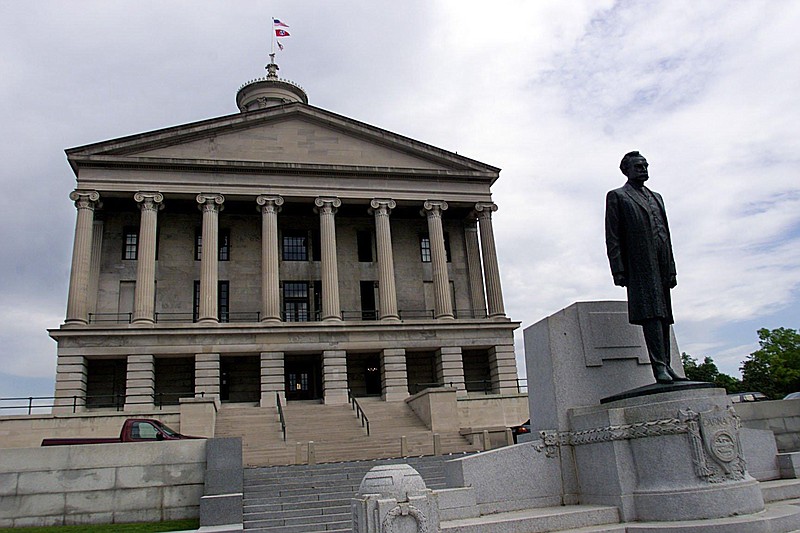NASHVILLE - Gov. Bill Haslam's gas tax, the state of California and more legislation kept Southeast Tennessee lawmakers jumping during this year's General Assembly.
Here's a breakdown of some of the legislation passed during the 2017 session:
* IMPROVE Act: Two major and intertwining issues dominated local lawmakers and their colleagues for most of the session. That was the state budget which had huge surpluses in one-time and recurring revenue and Haslam's effort to raise gas and diesel taxes for roads for the first time in 28 years.
The result was the IMPROVE Act. It raised gas and diesel taxes by six cents and 10 cents over a three-year time period for the dedicated highway fund.
At the same time it cuts more in other taxes, including cutting the state's sales tax on groceries by 20 percent, with reductions in franchise and excise taxes for manufacturers and the continued phasing out of the Hall Tax on stock and interest earnings.
While many Republicans in the House, including top leadership, opposed the legislation, it had the backing of nearly all Southeast Tennessee lawmakers. Hamilton County legislators pointed to the $600 million in funds coming to the county for interstate, road and bridge work as well as the expected beneficial impact on jobs generated by manufacturers like McKee Foods and Volkswagen.
Almost immediately after Haslam signed the bill into law, Finnish tire maker Nokian Tyres picked Tennessee over a competing offer in Georgia to put its new 400-employee plant in Dayton, Tenn.
""This is huge for us," said Rep. Ron Travis, R-Dayton.
* Civil War II? After California lawmakers passed legislation barring state-paid travel to Tennessee and other states over what Golden State officials believed to be anti-LGBT laws, Senate Operations Committee Chairman Mike Bell, R-Riceville, retaliated with a resolution.
The 2016 Tennessee law that drew California lawmakers' ire allows therapists and counselors to reject clients based on the professionals' "sincerely held beliefs."
Bell's resolution warns that "if states such as California persist in banning travel to certain other states as a punitive action for disagreeing with the policy of those states, the states affected by these travel bans may be forced to take reciprocal action."
* De-annexation bill: After three years of effort, Watson finally succeeded in passing a de-annexation bill, albeit in much amended form. It would allow disgruntled voters in portions of Tennessee cities annexed by ordinance after a 1999 planning law to push for public referendums to leave the city.
But various provisions added by other lawmakers lessen the impact. For example, the referendum originally involved just the affected area. But it now says voters across the entire city would vote on the particular section's efforts to secede. Another provision prevents so-called "doughnut holes" - that is areas entirely surrounded by a municipality - from trying to secede.
Carter intends to push his version of the bill next year in the House.
* Insurance changes: Following another years-long effort, Watson this year finally succeeded in passing his Provider Stability Act which is intended address long-standing gripes among physicians and other providers about abrupt changes by insurance companies regarding fee and payment schedules for treating patients.
* Lawmaker travel: Rep. Gerald McCormick, R-Chattanooga, passed a law requiring the public disclosure of most privately funded travel for Tennessee legislators. No amounts of money are required to be disclosed but McCormick said it's in the public interest to disclose such trips and who pays for them.
Senators insisted on including a provision that excludes disclosure of legislative "scholarships" offered by the American Legislative Exchange Council, a national group of conservative legislators and companies, to bring lawmakers to their meetings where "model legislation" is developed.
McCormick said that while he disagreed with the Senate provision, he wanted something passed and so finally agreed to senators' wishes.
* Needle-exchanges: Rep. Patsy Hazlewood, R-Signal Mountain, passed a law allowing nonprofit groups to offer free needle-exchange programs to opioid addicts. The programs, which could not utilize tax dollars, would have to be privately funded.
The goal is to draw drug users in for clean needles while offering them HIV and Hepatitis C testing as well as help kicking habits and finding work. Provisions include restrictions aimed at preventing centers from locating close to schools and parks.
* Alcohol laws: Legislation passed by McCormick and Gardenhire allows outdoor consumption of alcohol along a fast-developing 575-foot stretch of road adjacent to the Chattanooga Choo Choo complex. The measure would allow street fairs on Station Street, which runs from the 1400 block of Market Street to Rossville Avenue between the Choo Choo and The Terminal Brewhouse. But another McCormick bill to allow Sunday wine sales across the state failed to gain traction. Hazlewood and Gardenhire passed bills authorizing the Chattanooga Theatre Center and Finley Stadium in Chattanooga to allow on-premises consumption of alcoholic beverages.
Contact Andy Sher at asher@timesfreepress.com or 615-255-0550. Follow on twitter @AndySher1.
